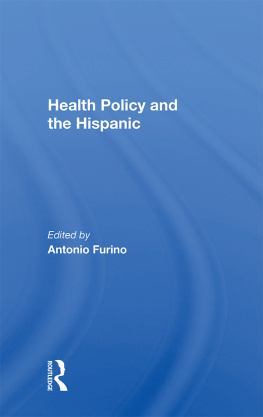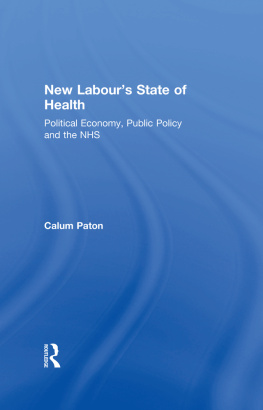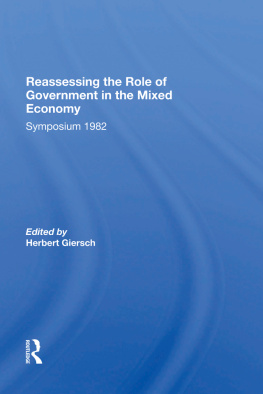Health Policy and the Hispanic
Health Policy and the Hispanic
Edited by
Antonio Furino
First published 1992 by Westview Press
Published 2018 by Routledge
52 Vanderbilt Avenue, New York, NY 10017
2 Park Square, Milton Park, Abingdon, Oxon OX14 4RN
Routledge is an imprint of the Taylor & Francis Group, an informa business
Copyright 1992 by Antonio Furino
All rights reserved. No part of this book may be reprinted or reproduced or utilised in any form or by any electronic, mechanical, or other means, now known or hereafter invented, including photocopying and recording, or in any information storage or retrieval system, without permission in writing from the publishers.
Notice:
Product or corporate names may be trademarks or registered trademarks, and are used only for identification and explanation without intent to infringe.
Library of Congress Cataloging-in-Publication Data
Health policy and the Hispanic / eduted by Antonio Furino.
p. cm.
Includes bibliographical references and index.
ISBN 0-8133-1456-9
1. Hispanic AmericansMedical careCongresses. 2. Hispanic
AmericansHealth and hygieneCongresses. I. Furino, Antonio.
[DNLM: 1. Health PolicyUnited Statescongresses. 2. Health
Servicesorganization & administrationUnited Statescongresses.
3. Hispanic Americans. WA 300 H43393]
RA448.5.H57H42 1992
362.1'089'68073dc20
DNLM/DLC
for Library of Congress 91-44201
CIP
ISBN 13: 978-0-367-00450-7 (hbk)
Contents
, Antonio Furino and Fernando A. Guerra
, Eli Ginzberg
, Eli Ginzberg
, David E. Hayes-Bautista
, Ray Marshall
, Michael P. Stern and Steven M. Haffner
, Giro V. Sumaya
, Fernando S. Mendoza, Stephanie J. Ventura, Laura Saldivar, Katherine Baisden, and Reynaldo Martorell
, David V. Espino and Marta Sotomayor
, Eric Munoz, Bartholomew J. Tortella, Mary Ann Sakmyster, Douglas S. Livornese, Maureen McCormac, John W. Odom, and Ramon Torres
, John P. Brown
, David E. Hayes-Bautista
, Fernando M. Trevino, M. Eugene Moyer, R. Burciaga Valdez, and Christine A. Stroup-Benham
, Adela de la Torre and Refugio I. Rochin
, David C. Warner
, Ciro V. Sumaya
Guide
A National Action Forum to analyze and discuss the impact of health policy on Hispanics was organized in the fall of 1989 by the Center for Health Economics and Policy of The University of Texas Health Science Center at San Antonio (UTHSCSA) and the San Antonio Metropolitan Health District. Many of the papers presented at the forum were revised and expanded for this volume.
We are grateful to the Partnership for Hope program of the Rockefeller Foundation for providing the project's seed money. Also, we are grateful to the Robert Wood Johnson Foundation for their generous contribution and for the financial and in-kind support received by the RGK Foundation, the South Texas Health Research Center of UTHSCSA, the Monsanto Company, the Benedictine Health Resource Center of San Antonio, the Center for Health Policy Development, Inc., of San Antonio, The Latino Health Policy Center of the University of California at Los Angeles, the IC2 Institute of The University of Texas at Austin, and the Office for Substance Abuse and Prevention (OSAP) of the Drug Abuse and Mental Health Administration.
Henry G. Cisneros, during his term as mayor of San Antonio, was the single most effective energy source and motivational force in bringing together the unique mix of public policymakers, academicians, large-scale private sector employers, third-party payors, representatives of nonprofit organizations, and user groups that made the meeting a landmark in the development of a Hispanic health agenda and a rich base for this book. He personally participated in and contributed to the proceedings of the forum and, after completing his term in office and choosing to turn his attention to professional endeavors in the private sector, continued to be supportive and instrumental in ensuring the continuation of this discussion about vital public and private health policy issues. As this book is being published, a new round of contributions is being planned to bring the discussion documented in the volume to a greater level of precision for policy guidance. To Henry, a heart felt "thank you" for his support and inspiration.
Assisting Henry Cisneros, a national steering committee, including Eli Ginzberg, John K. Iglehart, Lawrence S. Lewin, Marion Ein Lewin, Lionel Sosa, Ciro V. Sumaya, and T. L. Tolbert, provided guidance in planning the forum and this publication. Among them a very special mention goes to Eli Ginzberg who read and critiqued drafts of this book, offering, whenever needed, important advice, I am grateful to Fernando Guerra who shared with me the many challenges of planning and implementing the forum.
Many colleagues at The University of Texas Health Science Center at San Antonio offered generously their time and advice. Carlos Moreno coauthored a report on the issues that served as a background for the forum participants.
A large debt of gratitude goes to every participant in the forum, and a special recognition is due to the authors of the chapters in this book for maintaining their enthusiasm and commitment after the event.
I am grateful to Mary Jane Bode for her editorial assistance, to Joanne Hayashi and Marie Tysall for attending with creativity and efficiency to the logistics of the forum, and to Marie Tysall for assisting in the typing of the manuscript.
Antonio Furino
Part One
Issues and Value Questions
1
The Issues: An Overview
Antonio Furino and Fernando A. Guerra
As we learn more about the people and their health status, we discover that Hispanic health issues are better understood and more successfully addressed when we take into account the Latino health discourse (see); the viewing of evolving health needs in the historical context of the intellectual and socioeconomic experiences of Hispanic people in the United States. We learn, in our culturally diverse society, that the best opportunities for development and growth are captured when cultural differences contribute to common goals. This occurs when we are able to reinforce rather than dilute the unique strengths that each cultural heritage has captured and preserved over time.
Exploring several dimensions of major Hispanic health issues gives a special character to this book. The intent is to update interested readers with recent information and offer a view of the magnitude, scope, and complementarity of the problems.
Because most Hispanics reside in urban areas, before introducing the contributions to this volume, it may be useful to review certain conditions characteristic of metropolitan health service delivery systems that are neither culture- nor race-specific but that act as barriers to the planning and implementation of targeted health services.
First, a critical mass of efforts capable of bringing relief to the numerous and complex health care needs outlined in the following pages will not be generated by federal public policy alone. Unprecedented budget constraints will continue to limit federal public health programs. The Persian Gulf crisis, the savings and loan bail out, and the uncertainties of the national and global economies are pushing permanent solutions to current budget rigidities further into the future. The availability of federal monies for new programs or even continued support for existing ones will depend, in the foreseeable future, on their neutrality relative to the national budget and on a convincing rationale relative to competing initiatives. Grass-root strategies will offer the best hope of bringing about favorable changes in health behavior and a more effective utilization of existing health care ). But community activities will need the support of municipalities and the effective use of state budgets. Also, the role of employers, providers, third-party payors, suppliers, and other private sector institutions will be critical to any serious plan aimed at improving the health of the Hispanic work force or at facilitating the delivery of health care to the underserved.










